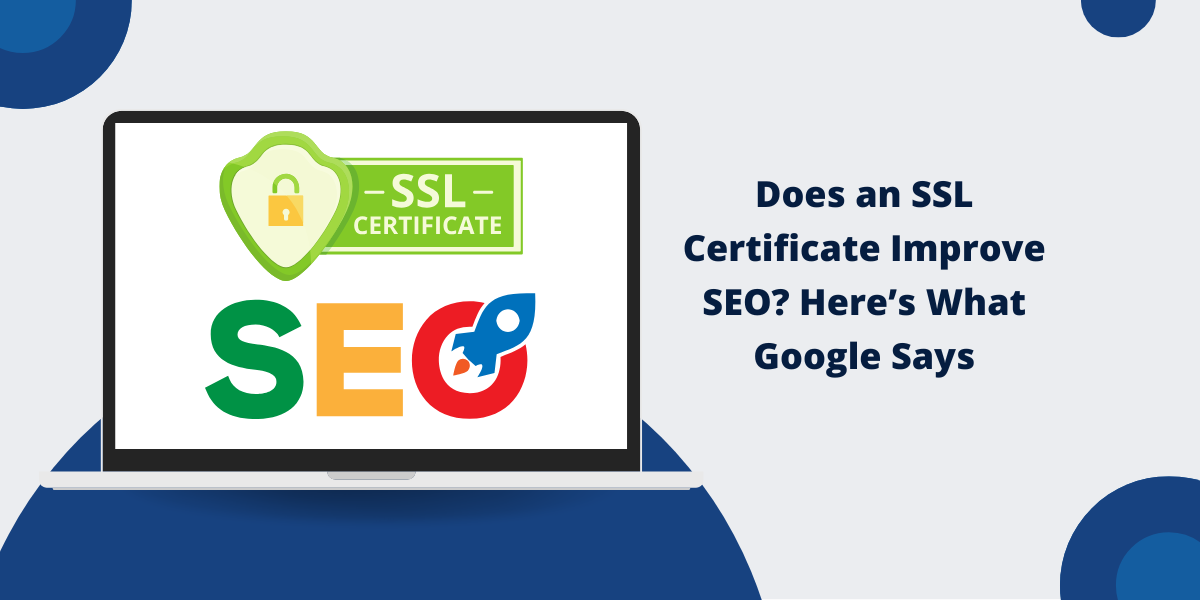When you’re building a website, there’s a lot of advice floating around about what helps your site show up higher in Google search results. One claim you’ll hear again and again is that getting an SSL certificate for your website – making your website “https” instead of “http” – will boost your SEO and help you rank better. But is this really true?
Let’s break it down in plain English so anyone can understand and look at what Google’s own experts actually say about SSL certificates and SEO.
What Is an SSL Certificate?
An SSL certificate is a type of digital security technology. You might recognize it by the Tune icon you see next to a website’s address in your browser, or by the website starting with “https://” instead of just “http://”.
Here’s what an SSL certificate does:
- It encrypts information that goes between your website and the people visiting it. This means if someone enters their name, email, or credit card info on your site, it’s protected from hackers.
- It confirms your website’s identity so visitors know they’re on the real site, not a fake one.
Because of these protections, SSL certificates are important for any website – especially if you’re collecting sensitive information or running an online store. But what about SEO?
What Google Says About SSL and SEO
A lot of articles and even some security companies suggest that having an SSL certificate will make your website rank higher in search engines like Google. To settle the debate, John Mueller, a well-known expert at Google, answered this directly. When someone recently posted on social media that an SSL certificate would “boost your website’s SEO and reputation,” John Mueller replied:
“This does not ‘Boost your website’s SEO’, sorry.”
That’s about as clear as you can get! According to Google, having an SSL certificate on your website does not give you a direct boost in search rankings.
A Bit of History: Why the Confusion?
Back in 2014, Google started encouraging all websites to use secure connections (HTTPS) for user privacy and security. They even made HTTPS a “ranking factor,” meaning it could have a small effect on your website’s position in search results. But here’s the important part:
Google said this was only a very lightweight signal – so small that it affected less than 1% of global searches.
They made it clear that high-quality content, site speed, and links from other websites were much more important for SEO.
Some people took this news and ran with it, thinking SSL was the magic ticket to better rankings. It isn’t.
Does Having SSL Help Your SEO At All?
Technically, HTTPS is a ranking factor, but it’s so minor that it’s almost impossible to notice in real life. Think of it like an extra sprinkle on top of a cake – it’s there, but it doesn’t change the cake itself.
Here’s why:
Almost every website uses HTTPS now. Because secure websites are the standard, you don’t get a real advantage for having it. If you don’t have it, you might stand out for the wrong reasons (such as browsers warning visitors your site isn’t safe), but having it is just meeting expectations.
It’s a tie-breaker at best. Some people say HTTPS might make a difference if two websites are identical in every other way, but this almost never happens in real life.
John Mueller also clarified that not having SSL does not mean Google will drop your site from their search results. It simply isn’t that big a deal from an SEO perspective.
Why You Still Need an SSL Certificate
Just because SSL doesn’t boost your SEO much doesn’t mean you shouldn’t have it. In fact, there are several important reasons why every website should be secure:
- It keeps your visitors’ information safe. This is especially important if you have forms, login pages, or any way for visitors to enter their data.
- It builds trust. Visitors look for the Tune Icon and expect modern websites to be secure. If your site isn’t secure, people might leave immediately.
- Browsers will warn users. Google Chrome and other browsers will display a warning if a website isn’t using HTTPS, which can scare people away before your site even loads.
- It’s often required for compliance. If you take payments, process personal data, or just want to avoid headaches, SSL is a must.
SSL is now the baseline for running a professional website, even if it’s not a magic bullet for SEO.
What Really Matters for SEO?
If you want to improve your website’s ranking on Google, SSL should be part of your checklist – but not because it gives you a special edge. For real results, consider working with an experienced SEO service provider who can help you focus on the things that actually matter most for SEO, such as:
- Great content: Create useful, well-written content that answers your visitors’ questions or solves their problems.
- Quality links: Get links from other trustworthy websites – these are a major ranking factor.
- User experience: Make sure your website is easy to navigate and loads quickly, especially on mobile devices.
- Technical basics: Use proper titles, descriptions, and headings; make sure your site is crawlable by Google.
Adding SSL is just one small piece of the bigger SEO puzzle. Think of it as the “seatbelt” for your website: you wouldn’t drive without one, but wearing it won’t make you drive faster.
The Bottom Line
There’s a lot of hype out there about SSL certificates and SEO. The truth is:
SSL is important for security, not for major SEO gains.
Google recommends HTTPS, but the impact on your search rankings is tiny.
If you don’t have SSL, browsers may warn visitors, and you could lose their trust.
Focus most of your effort on good content, links, and a great user experience for real SEO results.
So, get your SSL certificate – it’s the right thing to do for your visitors and your business. But don’t expect your website to suddenly climb the search rankings because of it. Good SEO strategy is about much more than just a Tune icon in the browser bar.

Priya Mervana
 Verified Web Security Experts
Verified Web Security Experts
Priya Mervana is working at SSLInsights.com as a web security expert with over 10 years of experience writing about encryption, SSL certificates, and online privacy. She aims to make complex security topics easily understandable for everyday internet users.



